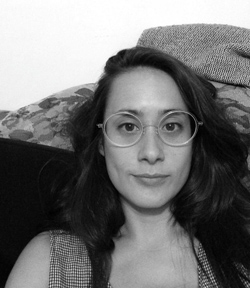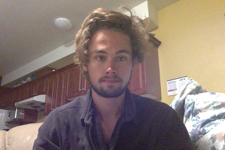A Quiet Urgency: Jack Crouch in Conversation with Maria Tessa Liem

Malahat volunteer Jack Crouch talks with our 2015 Constance Rooke Creative Nonfiction Contest winner, Maria Tessa Liem, whose memoir, "Rice Cracker," was chosen for the $1,000 prize. Her memoir will be published in Elusive Boundaries: Mapping CNF in Canada, Issue 193, Winter 2015.
Of Liem's winning story, contest judge Jane Silcott called it "A beautifully considered piece: driven by quiet emotion, delivered through art and craft."
See the original announcement page for Liem's CNF Contest win.
What attracts you to writing nonfiction? Is it your preferred genre?
Primarily I write poetry and fiction. Most of the time any nonfiction I write is in the form of journal entries. It's usually boring, unstructured, and melodramatic. But I have always kept a journal and when I was nine or ten years old, it was because my feelings and thoughts seemed very important. I thought they needed to be recorded and preserved, that after I died they would be published and widely read. I'm not sure where I got that idea from. Now, I keep a journal to try to figure things out. It is not my preferred genre to share though, it's usually private.
What difficulties do you encounter when writing nonfiction, specifically when it is a direct personal experience? What are the benefits of writing nonfiction?
When writing about myself and my history, I worry about my memory a lot. I talk about this in "Rice Cracker" a little bit, about how I have a very specific and vivid memory of a family dinner but I am not completely sure whether or not I made it up. This self-consciousness also reminds me that my experience of the world is limited, and small, and probably different than everyone else's but not any more important or significant. It's a simple thing but easy to forget, so I suppose that's one of the benefits.
Jane Silcott, judge for this year's Constance Rooke Creative Nonfiction competition, wrote of your winning memoir that "a quiet urgency underlies this writer's voice (that runs so smoothly, it's like reading one long thought unfurling)." Is this aspect to your piece something that you were aware of and spent time developing? Or, did the constraints of the form kind of force you to pack in as much content while still recounting the events of that day?
First, I think Jane Silcott is being quite generous with that comment (!). In this particular instance I was conscious of a frame I set up. This summer, I was reading a lot of personal essays and I noticed that I liked the ones that had this frame story, the one day, from which the writer could time hop. Recently, I went to a discussion lead by Ann-Marie Macdonald and she was talking about fiction mainly, but about structure, she told us we had to look for portals. I didn't have a way of thinking about it before but I like this idea that in one moment we have ourselves, or a character, reading the newspaper and then a car drives by and we hear a song that reminds us of something that happened 10 years ago and there's the portal. I started writing this piece a few days after visiting my aunt and uncle. Rather, I started re-writing it because that one day with them had revealed all these portals.
Questioning and discovering one's identity is a very formative experience. Have you written creatively about it before, or did this trip prompt you to contemplate the subject in depth?
It's true that putting these ideas into a structure—trying to fit thoughts into words, into sentences, into a story—is a specific kind of reflection. However, my identity is something that has always been questioned. Not just by me. I was an angst-y teenager, I am an angst-y adult, although now I might say neurotic, and I am shy so I spend probably too much time alone talking to myself about myself. But ever since I can remember people (strangers) have been asking me where I am from, or what my background is, or what my 'mix' is with the kind of intonation that always implies that Alberta is the wrong answer, so this questioning and discovering has been inescapable. Before this, I avoided writing about it almost completely. While writing about it this summer, I had conversations with close friends about whether it was even ok for me to start writing about my identity. I'm still not sure.
In addition to your prize money and having your memoir published, you also won five nonfiction works from Canadian authors. Will this inspire you to write more nonfiction?
It might. It's an exciting group of books and I'm most looking forward to reading Jan Zwicky's volume. She is one of my favourite writers, and anytime I read something she's written I feel inspired.
What current projects are you working on right now, and what else do you have planned for the future?
I am doing a Master's degree at Concordia right now so I will be working on a book of poetry for the next years and half. I am also the assistant on the event series, Writers Read, which is directed by Sina Queyras, so if I may, I'd like to plug it for any readers who will be in Montreal in 2016. We're having a festival in March called Off the Page. Ben Lerner, Dionne Brand, Fred Moten, Jordan Abel and so many more writers are coming to Concordia and if you come, you'll see them and you'll see me, probably giving a writer I admire a bottle of water or adjusting the lights.

Jack Crouch
* * * * * * * *









